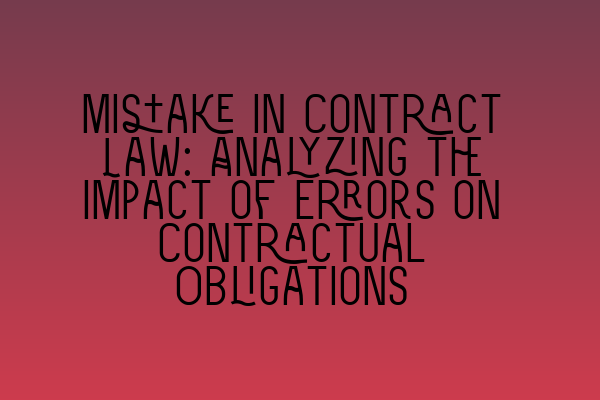Mistake in Contract Law: Analyzing the Impact of Errors on Contractual Obligations
Contracts serve as the bedrock of legal relationships in our society. They establish the rights and obligations of parties involved, providing a framework for business transactions, employment agreements, and various other arrangements. However, what happens when a mistake is made in the negotiation or formation of a contract? How does it impact the contractual obligations of the parties involved? In this article, we will dive deep into the complex realm of mistake in contract law and analyze its consequences.
The Concept of Mistake in Contract Law
Mistake, in the context of contract law, refers to an error made by one or both parties during the negotiation or formation of a contract. This error might arise from a misstatement, a misunderstanding, or overlooking an important fact. Mistakes can be categorized into three main types:
- Unilateral Mistake: This type of mistake occurs when only one party is mistaken about a material term or fact of the contract. It may result from a clerical error, an oversight, or misinterpretation of information.
- Mutual Mistake: A mutual mistake happens when both parties to the contract are mistaken about the same material term or fact. It often arises when there is a shared misconception or the parties were operating on faulty information.
- Mistake by Non-Disclosure: This type of mistake occurs when one party fails to disclose material information to the other party, leading to an erroneous understanding of the contract’s terms.
It’s important to note that not all mistakes will render a contract void or unenforceable. The courts carefully analyze the nature, impact, and effect of the mistake to determine its consequences on the contractual obligations.
Impact of Mistake on Contractual Obligations
The impact of a mistake on contractual obligations depends on several factors, including the type of mistake, the significance of the error, and the parties’ intentions. Let’s explore the potential outcomes of different types of mistakes:
1. Unilateral Mistake:
If one party is mistaken, but the other party knew or should have known about the error, the contract may be voidable at the option of the mistaken party. However, if the non-mistaken party can prove that they entered into the contract in good faith and relied on the mistaken party’s assertion, the contract may remain enforceable.
In cases of unilateral mistake, the court’s primary concern is to avoid unjust enrichment. They aim to strike a balance between protecting the rights of the mistaken party and preserving the stability and certainty of contractual relationships.
2. Mutual Mistake:
When both parties are mistaken about a fundamental fact, the contract may be deemed void ab initio, meaning it is treated as if it never existed. The rationale behind this is that the parties were not genuinely in agreement due to the shared misconception.
However, if the mistake is regarding a collateral matter or a future event, it may not render the entire contract void. In such cases, the court may modify the contract or allow the parties to rescind it.
It’s worth noting that proving a mutual mistake can be challenging. The court will require substantial evidence to support the claim, and the mistaken parties must prove that the mistake goes to the essence of the contract.
3. Mistake by Non-Disclosure:
When one party fails to disclose a material fact that they have a duty to disclose, the contract may be voidable. The duty to disclose arises in situations where there is a special relationship between the parties or when the non-disclosing party is aware that the other party is mistaken or is likely to be mistaken due to a mistake of law.
If the non-disclosing party deliberately conceals a material fact with an intention to deceive, this may amount to fraudulent misrepresentation, leading to additional legal consequences beyond contract voidability.
Seeking Legal Remedies
When a mistake arises in a contract, the parties may seek legal remedies to address the issue. These remedies may include:
- Rescission: The court may allow the parties to rescind the contract, meaning it is set aside and both parties are released from their obligations.
- Rectification: If the mistake is due to a drafting or clerical error, the court may rectify the contract by correcting the mistake to reflect the true intentions of the parties.
- Damages: In certain cases, the court may award damages to the innocent party to compensate for any losses suffered due to the mistake. These damages are typically awarded to put the party in the position they would have been in, had the mistake not occurred.
However, it is crucial to consult with a qualified contract law solicitor to determine the best course of action based on the specific circumstances of the case.
Conclusion
Mistakes in contract law can have a significant impact on the enforceability and obligations of the contracting parties. Understanding the various types of mistakes and their consequences is essential for both solicitors and individuals involved in contractual relationships. By seeking legal guidance and taking appropriate actions, parties can effectively navigate the complexities of contract law and mitigate potential risks.
If you’re interested in learning more about legal topics and the pathway to becoming a solicitor, check out our related articles below:
- Securing Training Contracts: A Roadmap to Becoming a Solicitor
- Mentorship for Aspiring Solicitors: Nurturing Talent in the Legal Field
- Legal Challenges and Pitfalls: Navigating the Complexities of the Legal System
- The GDL (Graduate Diploma in Law): A Pathway to Becoming a Solicitor
- Mastering the Solicitor’s Path: Prepare for the Journey Ahead
